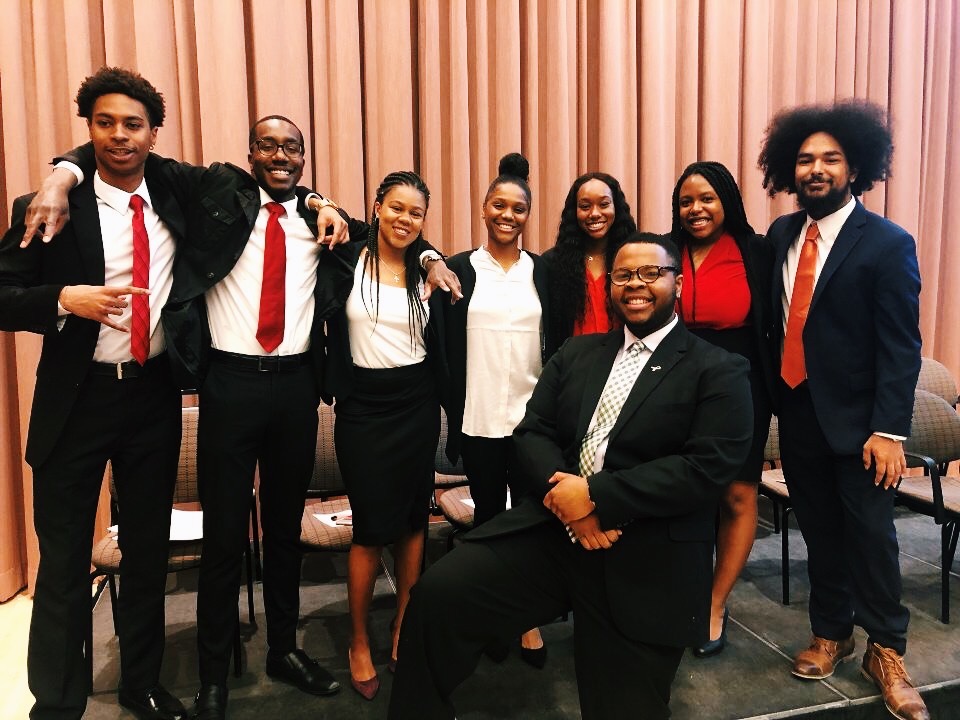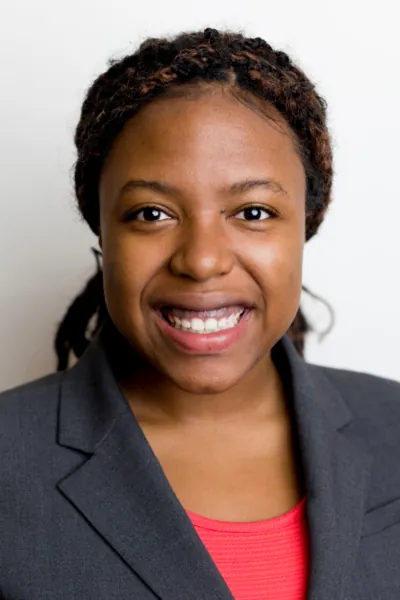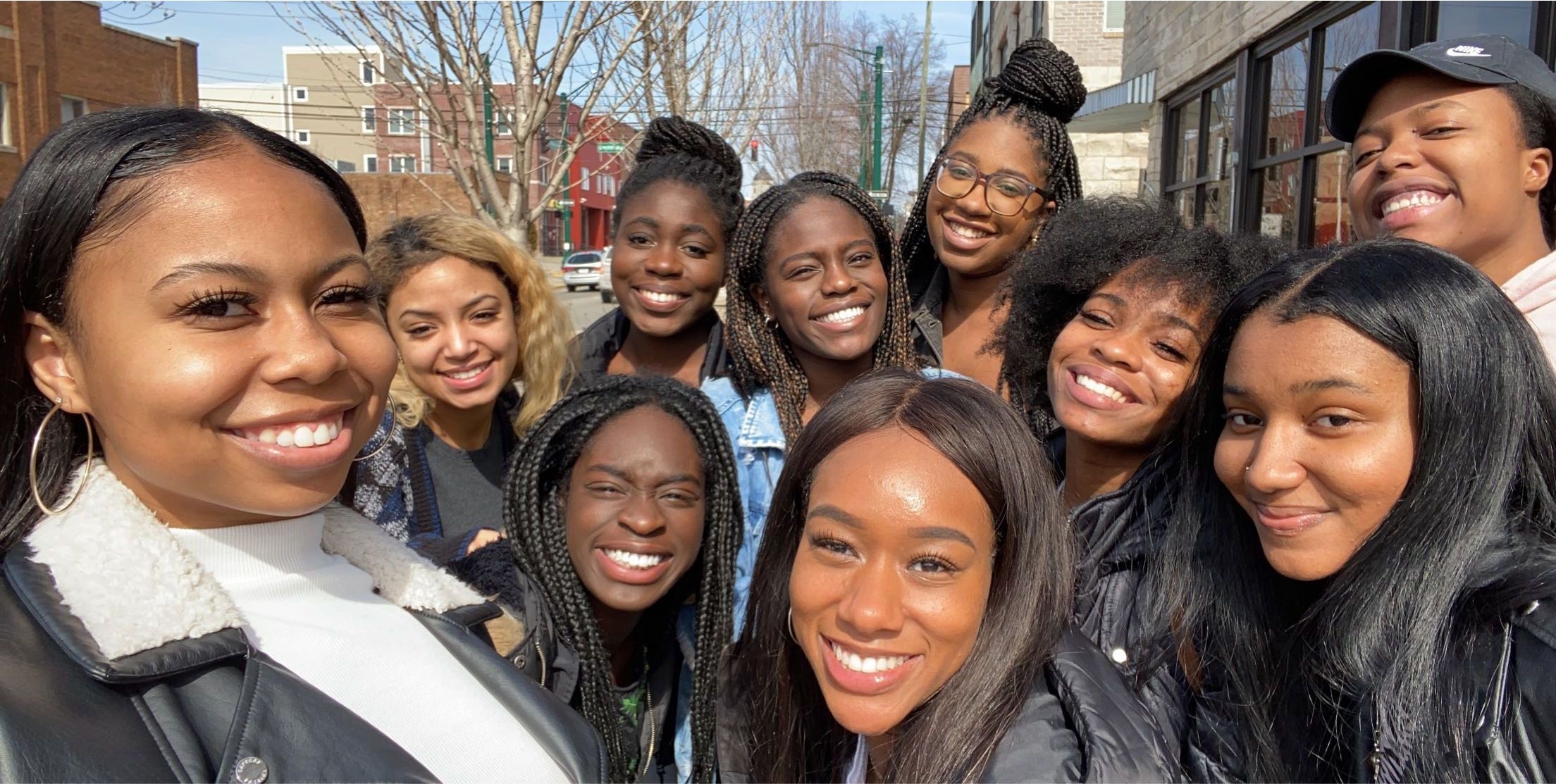
Vivienne Monger with Fry peers and mentors in Mu Beta Lambda Business Fraternity Inc. 2019.
This summer, I was a counselor for a program called MEET Kelley. It is designed to give minority high schoolers a chance to get to know the school and see if it might be a right fit for them.
This was my second year as a counselor and my third time with the program. When I was in high school, I participated in MEET and was introduced to IU and Kelley. The week allowed me to get a glimpse of college life in Bloomington. I was impacted by my mentors in the program and met young black women who are still my good friends to this day. In fact, two of the girls that I met during this week, Maiya Cook and Jada Hardin, have been my roommates for the last two years.

Vivienne Monger, Indiana University
A VISION FOR MYSELF
MEET Kelley is also where I first learned about the William R. Fry Scholarship, including its amazing financial benefits and the process for applying and getting accepted. To achieve the latter, I needed help so I went to my family.
The first conversation about the scholarship with my family was a memorable one. My uncle had also earned a William R. Fry Scholarship and she shared the amazing benefits and network he gained. He has worked for prestigious companies like Goldman Sachs and is now moving out to the West Coast to enter the tech world. Looking at him, I thought that there was no way that I would be able to get into Kelley let alone gain a full-ride scholarship. Those kinds of scholarships were for super-smart kids.
My grades were good, but my ambitions felt too large to be properly judged on a 4.0 scale. I have always been interested in politics and law, with dreams of going to law school. I also always knew that public policy, political science, and economics were some topics that I would want to study in undergrad. Combining these interests, I want to work my way into politics and shape the way Americans interact with big business. At 17, I struggled enough with articulating these dreams to my family. How could I do it in a personal statement to an admissions council?
WHY STUDENTS REALLY EARN SCHOLARSHIPS
Grades and statistics are an important part of the admissions process. However, you are being given the scholarship because of who you are and not your numbers. As a result, essays, interviews, and extracurricular activities become more important. Essays lend your voice to the room when you can’t be there. Interviews allow the school to gauge your behavior, how you react to hard situations, and your potential for leadership and success. And extracurriculars show tangible ways that you have followed your passions and interests while also rounding out your high school career.
In my experience, I was able to focus my time on three main activities in high school and take leadership positions in each. When it comes to extracurriculars, quality — as in involvement and leadership — is more important than the number of activities. And what’s most important is choosing activities that are interesting to you, not just choosing them because they might look good on paper.
For example, once I got into high school, I realized that they didn’t offer swimming as a sport, something that I had been doing competitively for most of my life. In response, I joined other swimmers at my school to start the swim team freshman year. On my resume, this activity reflected my ability to take initiative and lead. Scholarships, at their core, are a school’s way of saying we see you — not only your skills now, but your potential in the future. This was all advice that I was given by my mentors at IU and something that I have been able to see first-hand on the other side of the process.

Vivienne Monger and “Fry Friends” pictured with Ivy McGregor after on campus event
CONNECTING WITH OTHER FRYS
I interviewed for the Fry Program over the phone on a random school night during my last semester of high school. This was my second conversation with the school. I was so nervous: I was sweating through my clothes and my phone kept slipping out of my hand. The interview was a success despite my anxiousness. I was able to get across my passion for leadership and learning. I separated myself from the rest of the applicant pool by emphasizing my unique interests in law and public policy. Getting the scholarship felt validating. They could see me, who I am and the value I would bring to Kelley.
During a time when finding a community was so important, Fry was there for me. The family I gained once I became a Fry was invaluable; it has been hands-down the best part of the deal. Thinking back on my best memories in my three years since being in school, they all involve my Fry sisters: being dorm-mates and gathering in the common rooms for late-night study sessions or midnight birthday parties. I was paired with a random roommate and lived next to a fellow Fry Oti Ogbeide. We were the only girls in our scholarship who lived on that floor. We bonded over Marvel movies and Tyler the Creator, forming a strong bond that holds to this day. I remember staying in Hodge Hall, the main building for Kelley, with the girls to prepare for an exam paired with impromptu dance breaks or pizza runs. Once we transitioned from dorm life to off-campus life, our tight-knit group decided to stick together; we moved into an apartment complex close to campus and created new memories. We’ve continued to laugh and support each other throughout all of our goals, from academic to creative. Several of my friends, like Keira Segura, Maisa Muhammad, and Nia Rochon have become creative entrepreneurs and their growing success are only testaments to how a strong network can shape your college career.
Our connection isn’t just social, however. I have been able to keep my scholarship and grades due to the help and support of Frys both my age and older. I would reach out to older Frys for advice. Learning about the best teachers for a class or to never ever take an 8 am class was vital early on. This past semester I was able to finally start taking classes that were from my majors: Public Policy Analysis and Law, Ethics and Decision-Making. I took these classes online, alongside my roommate and fellow Fry, Maiya Cook as well as Sika Kodzi. Without the study help and accountability checks, these classes would have been a lot more difficult for me, and certainly not as fun.

Vivienne Monger and her friends in Bloomington
NEW POSSIBILITIES
I also wouldn’t have heard about Mu Beta Lambda Business Fraternity Inc. if not for older Frys. They encouraged me and a fellow Fry, Brooklyn Mosley, to join. We bonded and supported each other throughout the intake process and got to work immediately in partner roles as Intake Leaders after being initiated. Joining Kelley Student Government was also possible because Jordan Davis and Naomi Jackson, fellow Frys, encouraged me to apply. The organization has allowed me to hone my leadership and policy writing skills and explore interests I wouldn’t have otherwise considered. For example, I participated in my first case competition after being encouraged by Lorraine Michira and ended up placing second behind a different team of Fry Scholars!
These are the connections, memories, and friendships that are impossible to capture and put in a brochure. Each one of these Frys are not just names, but connections and friendships who have been able to support me throughout my college career, and who will impact me for years to come. I was able to find a group of amazing Black women in a school that is primarily White and in an industry that is dominated by White men. Scholarships can be more than just tuition or room and board. They can introduce you to like-minded individuals and create a community for you throughout college. Without Fry, I would not have met other Black women in business and law, let alone create the bonds that I have. I now also have a network across the world of smart and ambitious minority leaders whom I can reach out to for opportunities.
So now I leave the conversation to you. For the students not yet in college, tell me about something you want an admissions or scholarship office to see in you. For my peers and professionals, what is something about the people around you that enriches your daily life?










